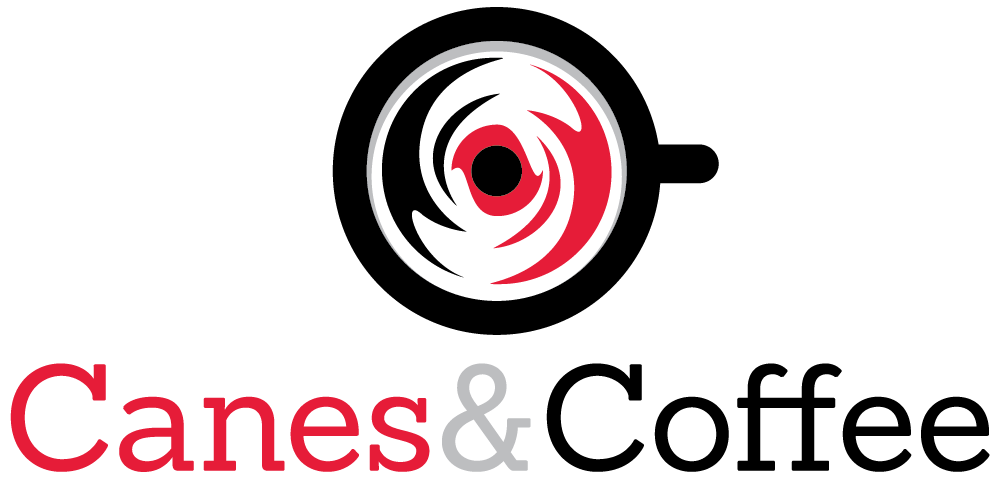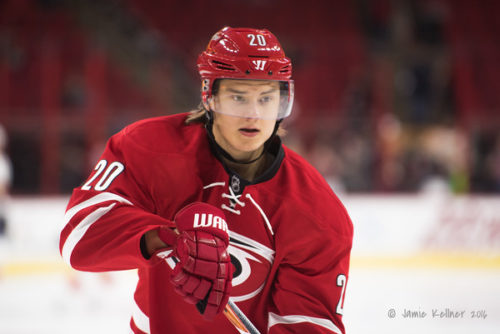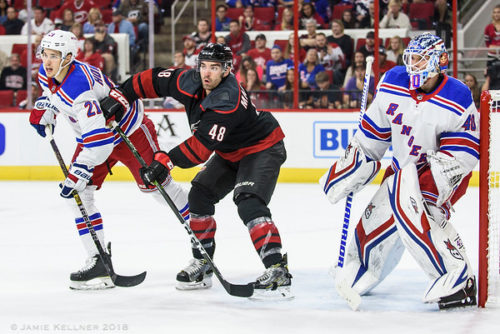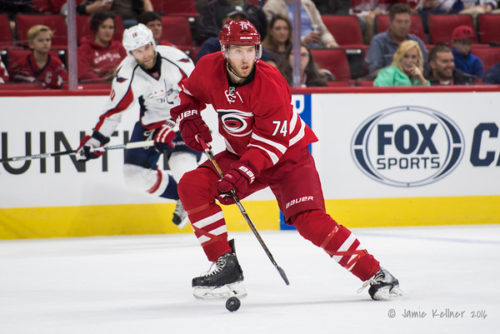Ilya Kovalchuk?
With another 80-90 Daily Cup of Joe topics needed to fill the long summer before we even get to training camp, sometimes you have to take what the hockey world offers you and ride it through another day. In addition to the playoffs, one of the things buzzing around the hockey world is the news that Ilya Kovalchuk wants to return to the NHL.
With the combination of contract, trade costs, his desired destination, Francis’ general approach to team building and other factors, I view Raleigh as a really low probability landing place for Kovalchuk. But the fact that the Hurricanes are looking to add a top 6 forward at least puts it within the realm of possible.
Ilya Kovalchuk’s contractual situation
For those who are not up to date, Kovalchuk has expressed an interest to return to the NHL after 4 years in the KHL. New Jersey still has his rights, but reports seem to suggest that just signing and playing there is unlikely. So that begs the questions of whether the Hurricanes would be interested, if/where he might fit in the lineup and also the trade and contract costs.
Where might Ilya Kovalchuk fit in the Hurricanes’ lineup and plan?
At a basic level, Kovalchuk fits the desire to add a top 6 scoring forward to the lineup. But there are two important caveats. First, Kovalchuk is a left wing. While the Hurricanes could fit another left wing in the lineup, the ideal addition would be a center. The Hurricanes have two top 9 centers in Jordan Staal and Victor Rask, but both are average at best offensively and not so much the type of player to center a true scoring first line. If you stick with Peters’ comments from the post-season press conference, the preference at least short-term is to leave Sebastian Aho and Elias Lindholm on the wing. That seems to leave a hole for a scoring center which Kovalchuk is not. But if he regains his scoring form and puts up 70 points, quibbling over position seems silly.
What is Ilya Kovalchuk capable of?
But that brings up my second caveat which is noting that what exactly Kovalchuk is capable of is a bit of an unknown. He is four years removed from the NHL and now 34 years old. Is it possible that he has near Jagr-like longevity and can still be at least 60-point scorer? Sure. But is it possible that he just is not capable of that anymore? That is also very possible. He has spent the past four years playing against lesser competition in the KHL and is on the wrong side of his prime. The short answer is that predicting exactly what Kovalchuk is capable of is far from a sure thing.
What about the cost?
For me, one of the biggest factors to consider is the commitment in terms of years. Because of the uncertainty around his re-assimilation into the NHL, I would be comfortable with a one-year deal without getting too bogged down in what the salary is. I would consider two years but start to care a bit more about the salary. And once the deal stretches to three or four years, my risk meter goes through the roof for a player who has been out of the league for four years and will be 38 years old when the deal concludes.
The other question is how much it would cost to even obtain Kovalchuk from New Jersey. For a might/could work who is a short-term fix, there is no way I am willing to win a bidding war which requires a first round pick or prospect equivalent. Something like a middle-ish third round pick is reasonable, and if the contract terms are reasonable just maybe I stretch to the Penguins second which is almost a third-rounder at this point.
The Hurricanes unique financial situation
When one looks at the salary charts for the Hurricanes, the gap between the 2016-17 season and the 2017-18 season jumps out. With Jaccob Slavin, Brett Pesce, Noah Hanifin and Sebastian Aho still on entry-level deals and Elias Lindholm in the final year of his relatively inexpensive ($2.7 million) deal, the Hurricanes actually have some work to do to reach the salary cap floor. Scott Darling starts to make the math work, but it is not like the Hurricanes do not have some budget left even if they push up above the cap floor. But next summer sees the Hurricanes likely needing to award raises, some significant, to Slavin, Pesce Hanifin and Lindholm, and the following summer sees Aho likely scheduled for a big raise and Jeff Skinner coming off contract too.
When you net it out, Francis might have some extra money to spend this summer, but then he might want it back the following summer.
Kovalchuk’s fit in Ron Francis’ plan
The move does not jump out as the type of deal that Francis would do, but then I am not sure we actually know as much as we think about Francis as he enters the next phase of building the Carolina Hurricanes. Through three years, he has been in patient “build for the future” mode. We are just beginning to see what Francis’ work looks like when the dial shifts to more of a “win now” priority. So while I still think that Francis has a preference for more longer-term additions or the shorter-term fix that Kovalchuk represents just maybe he makes an exception or two because it costs enough less than spending massive amounts of futures on better options.
So what deal would I do?
Top 6 scoring talents do not grow on trees. They are rarely available in free agency, are expensive when available and would be tough to lure to Raleigh without overpaying right now anyway. And the ones that might be available via trade could cost a minor fortune in trade assets. So if Kovalchuk became available for enough of a discount relative to other options, I would consider him. The risk, imperfection in terms of positional match and his age just decrease what I would pay.
So if Kovalchuk wants four years at full market price of $6 million or more per year, I pass.
If Kovalchuk costs a first round draft pick or some big package of futures, I pass.
But if the market is more tepid, and I could add the high-end potential that Kovalchuk brings for a third or possibly second round pick and only have to commit to one year at almost whatever price ($6 million or a tiny bit higher?), I would look past the imperfections and do it. If it requires a two-year commitment but maybe at a lower cost, I would consider it.
I view the one-year deal scenario as somewhat similar to a trade deadline rental deal. At the trade deadline a second or third round pick for a higher-end player for only the last quarter of the season is often the going rate. In this case, Francis might be taking a tiny bit more risk, but he is getting a full season, not just 20ish games.
And while a one-year deal risks Kovalchuk leaving after the 2017-18 season, it also assures that he has maximum motivation to excel such that he can negotiate his next contract on favorable terms.
A two-year deal is obviously more than a rental but still carries a somewhat modest risk.
In the end, I consider this a significant long shot and would be surprised to see it happen. But at a minimum, it offers something interesting to bandy around in mid-May, and for that I thank Ilya Kovalchuk.
What say you Caniacs?
Would you consider Ilya Kovalchuk at all because of the potential offensive upside, or would you pass immediately out of principal because it goes against Francis’ build from within approach and goes too much in the direction of taking short-term fixes?
If interested, what is your ceiling for trade assets to acquire Kovalchuk, contract term and annual salary?
Who do you like better than Kovalchuk to provide another high-end offensive player to fill out the Hurricanes’ top 6 forwards?
Go Canes!




Matt. Thanks for opening up an discussion about Carolina’s (basically RF’s and BP’s) short and long-term strategy.
As far as Kovalchuk, I say no without much more consideration.
He was one of the the biggest point producers in the league for several years, but when he played 50 games or more, he was NEVER plus in +/-. I understand that as a single statistic +/- has problems and that many of Kovalchuk’s teams were poor, but still if you are the biggest point producer and every year your team nets out being behind, that is not good.
I hope RF/BP are building a team that wins by having four lines/12 forwards who over the course of the year outperform (read produce more than they give up) their opponents. Sure it isn’t going to happen for every player or every game, but a top-to-bottom lineup that can play 200 feet is the future.
Matt. One point I forgot. I am glad to see you brought up the need for financial flexibility the next 2-3 years. When you briefly went to “the dark side” yesterday, I was afraid you were going to start writing every post with a “spend it all, spend it now,” mentality.
I wouldn’t waste much time considering Kovalchuk if he’s expecting a big payday (why else is he coming back?). He only makes sense on a one year or two year deal at 3-4 million a year if we only give up a 2nd or 3rd round draft pick to get him. There are other better fish in the pond if we are willing to spend this or more. Per ct’s comments above I am put off by his overall game.
The paranoia about OVER SPENDING… is more than a little bit puzzling to me! 1. This team has over-spent WHEN? 2. 80% OF THE TEAMS spend within a few Mil of the cap. 3. Half of those teams make the PLAYOFFS CONSISTENTLY. 4. Being FRUGAL… has got the Canes into the PLAYOFFS…how often? 5. Do the math…let’s try something different… 6. If you end up with TOO MANY GOOD PLAYERS…EVER…THAT’S A GREAT PROBLEM TO HAVE!!
Puckgod, we’re paranoid because over-spending doesn’t work, and ends up wrecking teams long term. Toronto has been near the top of the cap spenders for 20 years, how many playoff appearances have they made?
The top spenders this year? The Red Wings, who signed two of the biggest free agents last year with Nielsen and Vanek. How did they finish? (The answer is lower than the Hurricanes who spent $22 million less)
Should we spend more? Yes, to keep the good players we’re developing, not on some overrated (Gagner) or overpriced (Oshie) free agent that will hamstring us for years.
Sure we can fork over massive amounts of dollars to some less-than-stellar player, but when we get booted in the first round, find out we couldn’t actually afford that player, and get stuck having to trade our young talent just to get out of contracts (see Chicago) We do that, we might as well hand our team over to Quebec with a giant bow on it. GMRF’s method is going to work. And that will be the happiest ‘I told you so’ of my life, when it does.
Puckgod, I don’t think any of us are against spending. The key word is “overspending.” Virtually all the successful teams (Pittsburgh, Chicago, Columbus, Nashville, Edmonton, Anaheim, etc.) that were in the Canes category for several years got better through the draft with high draft picks. If we currently were where Washington was the past two or three years which was already having accumulated a good core through the draft (Ovechkin, Holtby, Alzner, Carlson, Backstrom, etc.), then adding to the strong core by spending (not overspending) to fill in the holes (Williams, Oshie, etc.) while the younger core is in their prime makes sense. Look at Columbus and Nashville for example. They didn’t improve by going out and spending big bucks, they made smart trades trading away from their depth to fill areas of need. Just consider what I am saying and see if it makes sense to you. If not, feel free to roast me along with Francis as no one ever accused me of being an expert on all this. I give you my reasoning however lousy it may be. Keep writing regardless of whether you and I agree as I admire your enthusiasm and desire to see the Canes get back into Cup contention. I even agree with you about half the time, so in your eyes I must be correct about 50% of the time. That ain’t bad is it?
You pick one or two teams and think THAT supports your argument?
How about all the teams (including Det. And Chi.) Who are in the playoffs year-after-year-after-year…? I want those problems EVERY YEAR…ALWAYS!
I mean, they’re real life examples that prove the point. Chicago made the playoffs every year because of the draft. Toews, Kane, Keith, Crawford and Seabrook were all drafted. Same with Zetterberg, Howard, Nyquist, and every star the Red Wings ever had.
I give you one or two teams because I don’t want to write a novel, but if you want a list of every time spending big on free agents has failed vs. the number of times it succeeded, I would be happy to drop that knowledge. Minnesota is the only team in the NHL where spending big on free agents has actually worked even a little bit, and they’re going to be in a world of cap hurt in the next 2-3 years. If you have an example to the contrary, of a consistent Cup-worthy playoff team, built around free agents, I’d be happy to hear it. Player development is the proven most efficient way to build a championship caliber hockey team (with a trade or three thrown in). This is a history accurate, statistically based fact.
Fogger. I think you are correct. But I also agree with tennininumee over at the Coffee Shop–there needs to be one “star” and usually at center to capture the Cup. But even then I am optimistic about your “build them from within” belief. In fact, if Aho or Lindholm can play center and Roy keeps developing into a 30-goal scorer, then center might be our strenght in 2-3 years with Staal, Rask, Aho/Lindholm, and Roy being the deepest group of talent in the league.
I do hope management satisfies Puckgod by adding a scorer–whether from trade, UFA, or quick success for Zykov/Gauthier. I really think (not just optimistically believe) that 17-18 is the beginning of a long stretch of playoff hockey with a team built to keep improving the next 5 years.